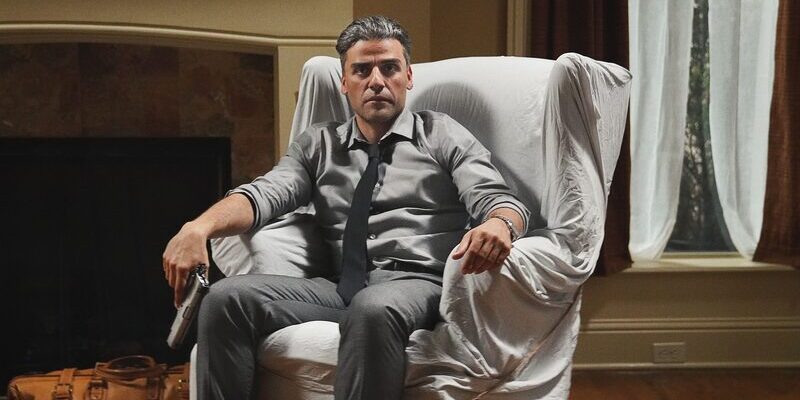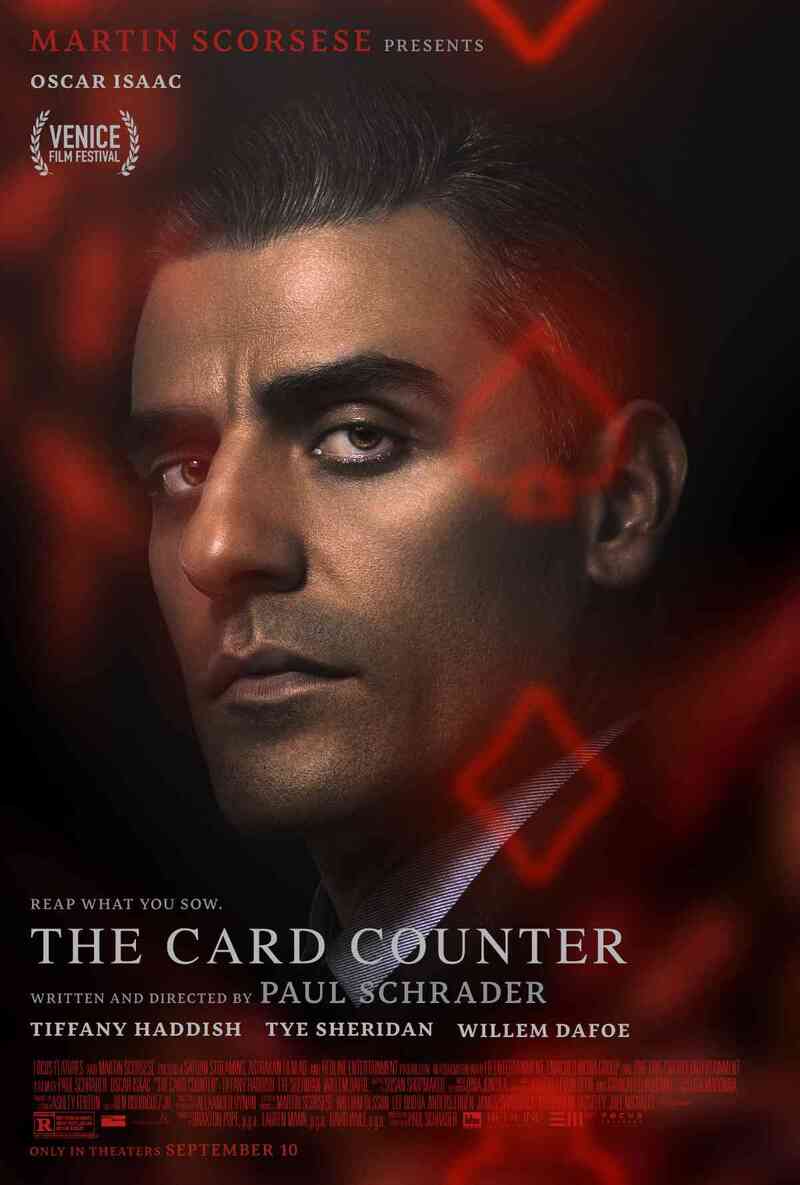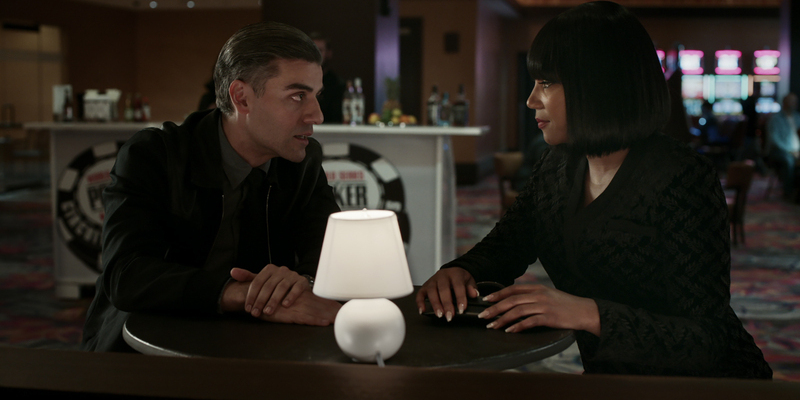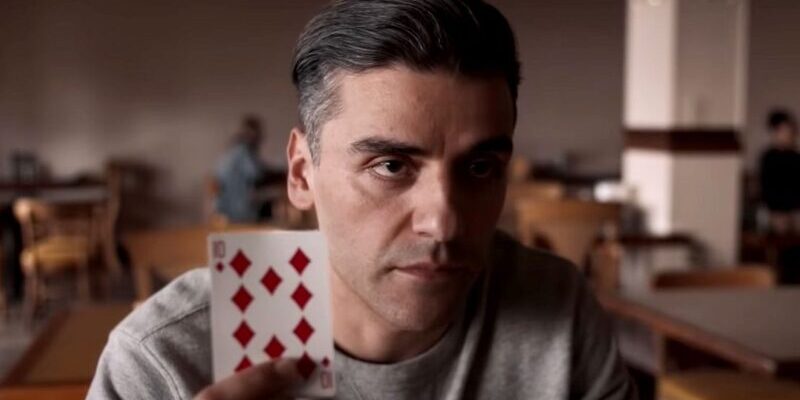
Review by
Eric Hillis
Directed by: Paul Schrader
Starring: Oscar Isaac, Tye Sheridan, Tiffany Haddish, Willem
Dafoe

In recent years "auteur" has become a dirty word for some. There's a
school of thought that believes filmmakers should simply be guns for
hire with no interest in revisiting the same themes or styles that
preoccupy them, that they shouldn't keep making "the same movie" over
and over again. I couldn't disagree more with that school, which reduces
filmmakers to department store employees who know a little about
drapery, a little about garden furniture, a little about washing
machines, but not a lot about any of them. If my toilet blocks up I'm
calling a plumber. I don't care if he "only fixes toilets."
Students of the anti-auteur school should best avoid
Paul Schrader's latest film The Card Counter, as it's very much the latest Paul Schrader film. Good old Paul knows
what he likes and likes what he knows. Like his previous film,
First Reformed, arguably his finest work as a director,
The Card Counter is for better or worse another reworking
of Taxi Driver. We get another lonely man keeping a journal in a sparse room as he
attempts to protect a youngster while treading a dark path towards his
own destruction. And of course there's a woman who offers a ray of
light, if he can just summon up the will to follow that light.

The lonely man here is William Tell (Oscar Isaac), who served
time in a military prison for his role in the atrocities at Abu Ghraib.
While inside, Tell taught himself the skill of counting cards. Now he
applies that skill to make a living as a card player. He could make
millions but he sticks to modest winnings to evade detection. While he's
duped many casinos, his skills have caught the eye of La Linda (Tiffany Haddish), a recruiter for a stable of card players backed by
millionaires.
Tell is reluctant to join La Linda's stable, but two things change his
mind. He falls for the sassy but soulful La Linda, and he has an
encounter with a troubled young man, Cirk (Tye Sheridan). Like
Tell, Cirk's father was involved in the torture of prisoners, but his
guilt drove him to suicide. Now Cirk wants to assassinate Major John
Gordo (Willem Dafoe), the private military contractor who devised
the "enhanced interrogation" methods employed by Tell and his father.
Believing he can turn him away from such a dark path, Tell takes Cirk
under his wing as they hit the World Series of Poker circuit.

If you're expecting a buddy road movie ala
The Color of Money, you obviously haven't seen a Paul Schrader movie before. Tell and
Cirk are two damaged men, victims in their distinct ways of the fallout
of 9/11. They're not exactly big on chit chat, but they bond in the
manner of cowboys on a long trek toward a promised bounty. Tell is that
classic western protagonist who has done bad things in his past but now
just wants to settle down on a modest piece of land. If you think things
are going to work out for him, well you obviously haven't seen many
westerns.
Schrader is working from a well-worn template here, and your tolerance
for The Card Counter will depend on how invested you've
been in that template in the past. He may be working within his comfort
zone here, but Schrader's idea of comfort is still more disruptive than
most American filmmakers working today, and of the Movie Brat generation
filmmakers, he's arguably the one who's done the most interesting work
in the past decade.

Here he takes that very romantic figure, the gambler, and strips down
the archetype to such a degree that the glamour of gambling is
completely removed. Not since the closing moments of Robert Altman's
California Split (the best gambling movie ever made) has
gambling, and winning, seemed so soulless. The fact that Tell has
figured out a way to win at a game by essentially turning sport into
science takes the thrill out of the game – the mystery of every hand is
gone. We're never in any doubt that Tell is going to win every time, at
least when he wishes to.
But this isn’t a sports movie, it's a Paul Schrader movie. We see this
in an early scene when Tell books a motel room and proceeds to cover
every item of furniture, even the lampshades, in bedsheets. His
motivation for doing so is left ambiguous. Is he trying to recreate the
austerity of prison? Does he want a life free of distraction? Is he a
cleanliness freak? Is he worried about leaving fingerprints? Probably
best not to try to get into this man's mind. You may not like what you
find.

